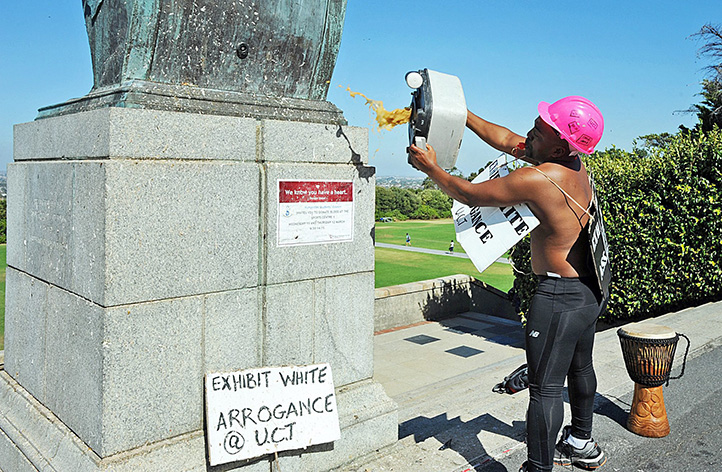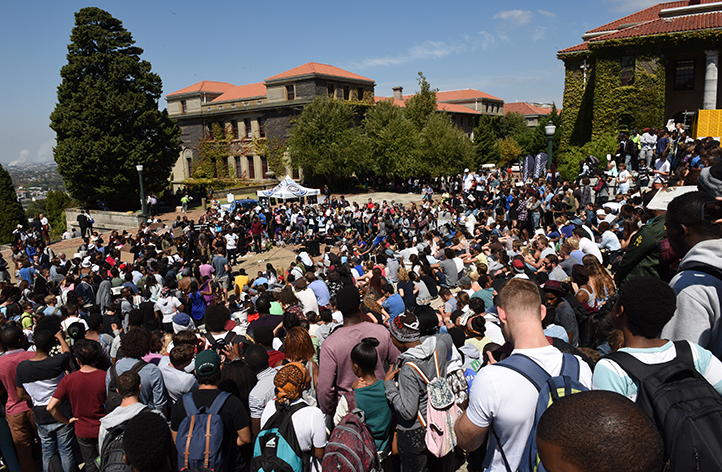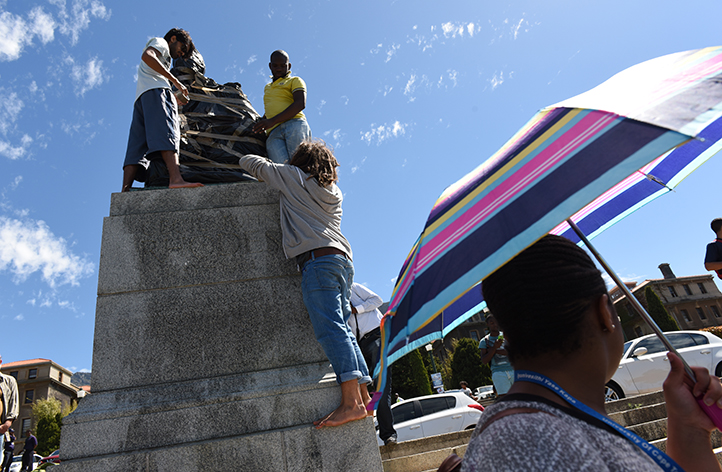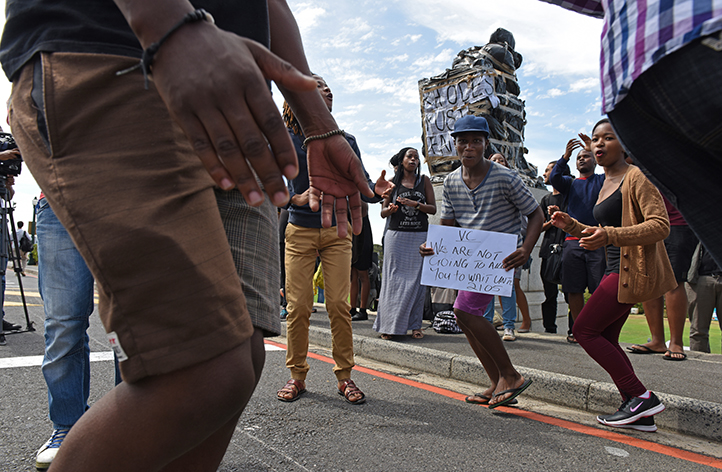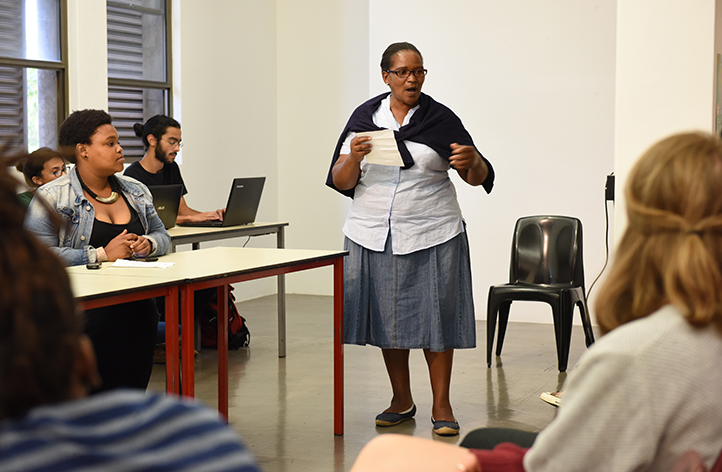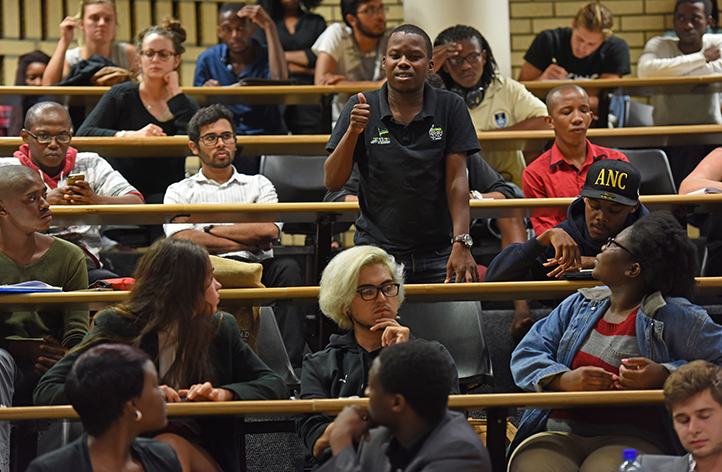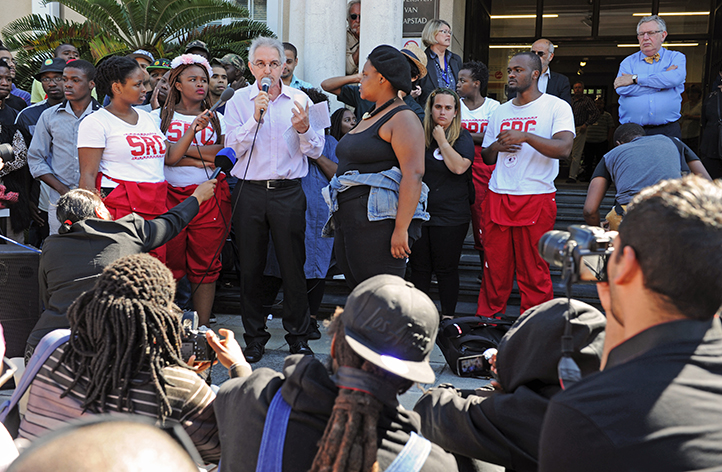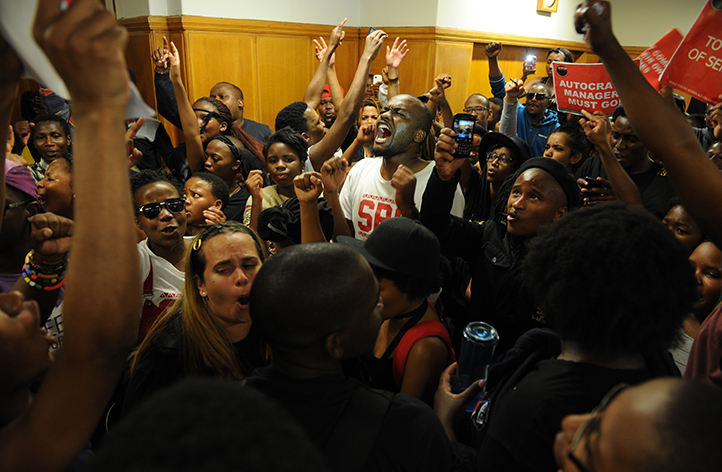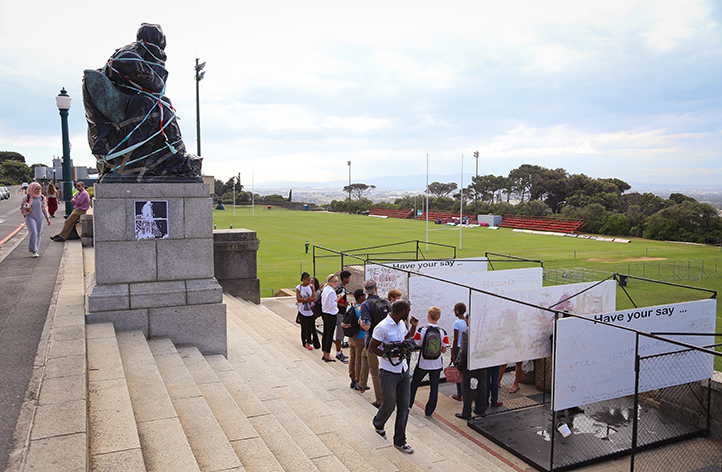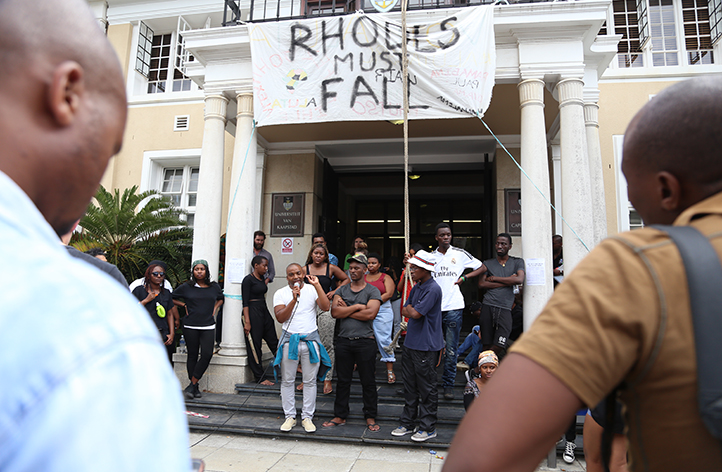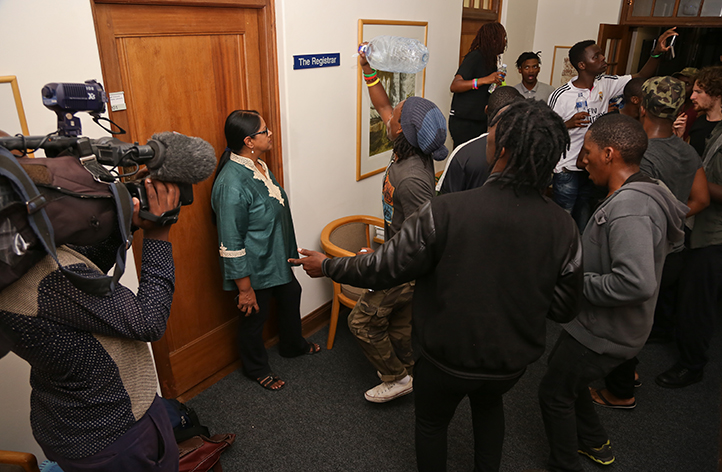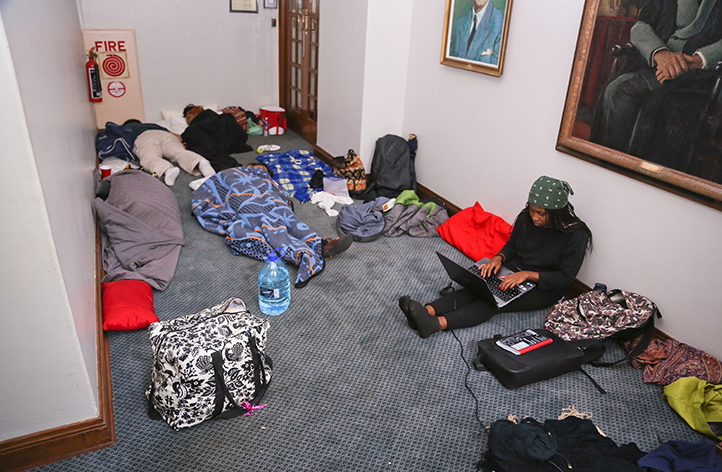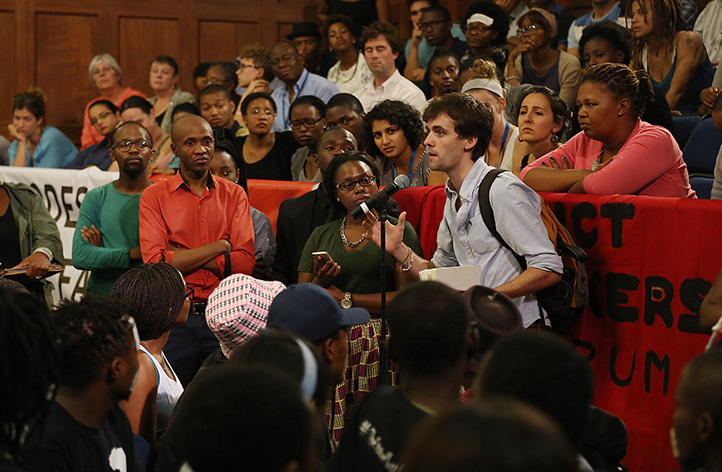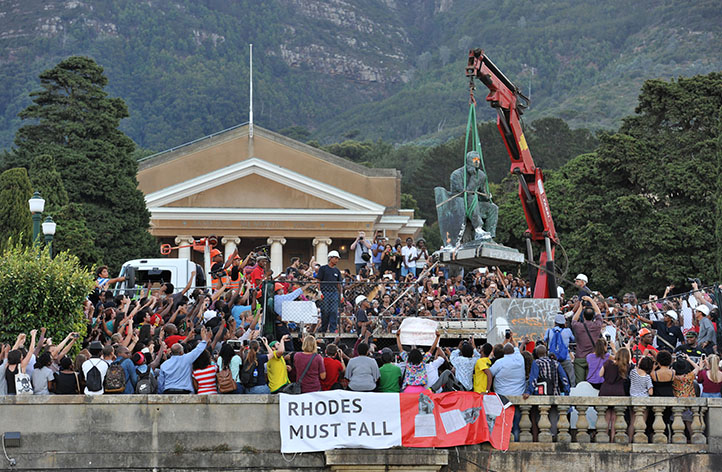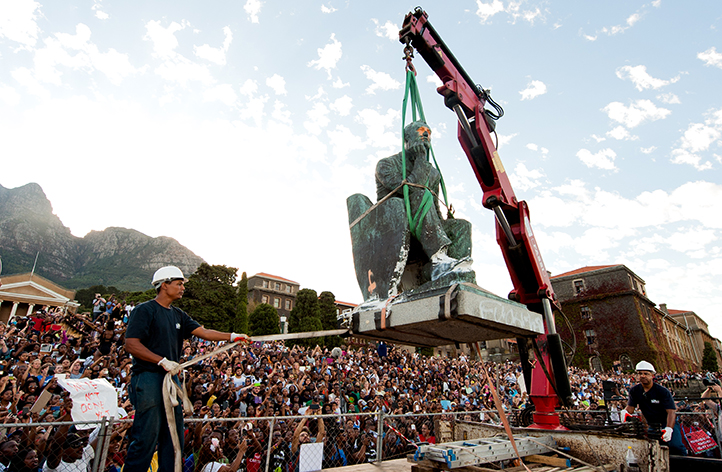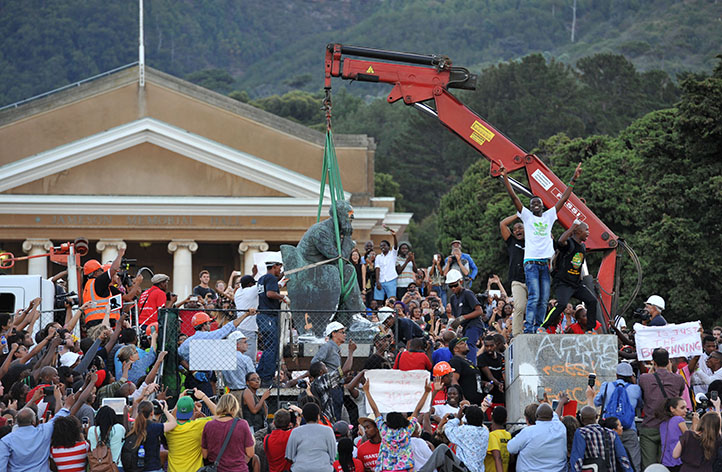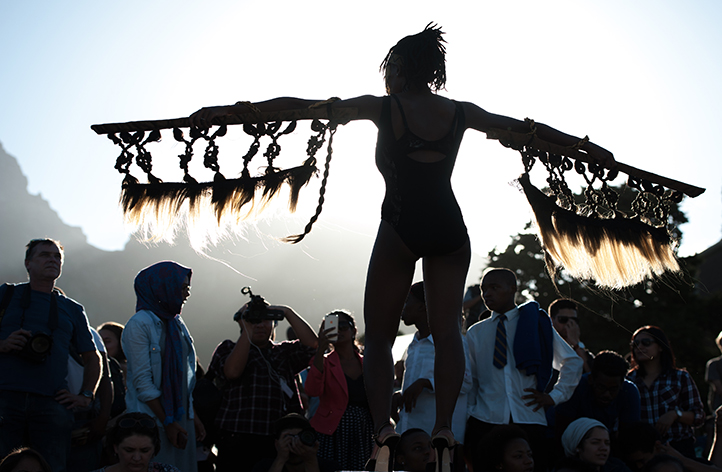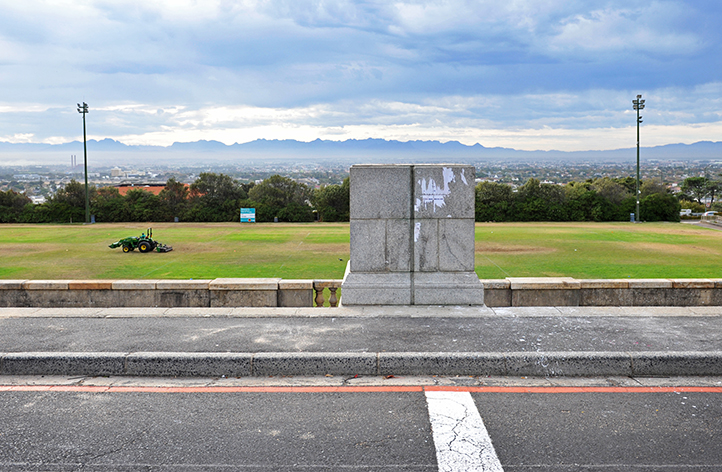UCT’s elephant in the room: #RhodesMustFall
18 March 2015 | Opinion Wandile Goozen Kasibe. Photo Michael Hammond.
Chevening scholar and UCT fine arts alumnus Wandile Goozen Kasibe comments on the Rhodes debate:
Edward Said once observed that, "appeals to the past are among the commonest of strategies in interpretations of the present. What animates such appeals is not only disagreement about what happened in the past and what the past was, but uncertainty about whether the past is really past". It is this sense of not so 'pastness' of the past, its controversial legacies, that have come to haunt the University of Cape Town (UCT). Colonialism's deadly agenda of dispossession, dehumanisation and denial of rights live on its 'elephant in the room', the statue of Cecil John Rhodes, an ardent believer in colonialism. This has been called out by students who view the statue as a disturbing feature and a glaring reminder of African black people's genocide whom Rhodes had killed mercilessly in his lifetime. Renewed student protests have called for the dethroning of the statue of Rhodes from the centre of UCT's public space.
Rhodes spent his lifetime sustaining the institutionality of the British colonial empire, a racist bigot who in 1887 told the House of Assembly in Cape Town that "the native is to be treated as a child and denied the franchise. We must adopt a system of despotism in our relations with the barbarians of South Africa".
It is this belittling denial of Africans' right to life and human liberties that Rhodes stood for; he privileged colonists' interests and championed the intergenerational transfer of wealth, sustained over centuries. Therefore the image of Rhodes invokes the intergenerational agony that black African people have endured for centuries, and represents the toxic collusion between the institution and the broader colonial project whose legacy still exists today.
He was a capitalist and colonialist par excellence, whose socio-political and economic dealings led to forced removals and genocidal acts against indigenous and native peoples in Southern Africa. Rhodes hunted down and killed those who dared stand in his way as he usurped Zimbabwe land by land as his own property in racist 'land grabs', terrorising local people with scores of lynchings – now recognised as acts of genocide, thus supporting the colonial agenda to take by force land and resources that belonged to African people.
When Rhodes became Prime Minister of the Cape Colony in 1890 he "implemented laws that would benefit mine and industry owners", thus pushed black people from their lands to make way for industrial development. This was a precursor to the devastating Land Act of 1913. Rhodes had reduced black people as a race to units of production for exploitative profit. It is this glaring painful legacy that Rhodes invokes, which led to the cataclysm of 20 June 20 1913, when the "South African native found himself [herself] not actually a slave, but a pariah in the land of his birth" as Sol Plaatje accounts in his classic account, "Native Life in South Africa".
Rhodes may represent heroism to those who have benefited from his unethically stolen inheritance, but to the majority of black people, he is a national shame not a national hero. His wealth was acquired through the sweat and dehumanisation of our people, and black students and academics who have received or receiving Rhodes scholarships should not be ashamed to receive those scholarships, because that is the money that was acquired at the expense of their forebears. And in fact it is their money. When Rhodes arrived in Southern Africa he had nothing and all that he had acquired was as an outcome of black people's exploitation. So black people don't owe Rhodes anything.
The disturbing irony, however, is the realisation that the statue of Rhodes, fixing his gaze out over the rugby fields of UCT, still stands tall, symbolising whiteness, its comfort, wealth and control of means of economic, cultural and academic production right at the 'heart' of UCT's upper campus. Students who walk into campus are reminded every day of this ancestor, whose deadly racist ethos has injected itself into the institutional 'DNA' and 'heartbeat' of UCT, thus its continued refusal to transform and to be transformed. Why must students be subjected to continued psychological colonialism in an institution that claims to embrace transformation and it's decolonial agenda? How can UCT hold on to Rhodes' statue as a reminder of black people's collective genocide, and yet wish to be seen to be pushing for transformation? There is no middle ground here, it's either the statue comes down to be relocated to Rhodes Cottage in Muizenberg, or UCT risks being revealed as the last fortress of academic colonialism and racism that continues to privilege white power at the expense of human progress and the country's constitutional demand.
Chumani Maxwele and his fellow students have remembered the words of the African philosopher, Frantz Fanon who once said, "Each generation must, out of relative obscurity, discover its mission, fulfill it, or betray it" and that "what matters most is not to know the world but to change it".
Through his institutional critique, Maxwele has opened our eyes to see the unseeable, echoed the silenced voices of the marginals to reason towards dismantling the monolithic statue of institutional racism as embedded in the fibre of institutions of higher learning such as UCT, Rhodes University and others. He has united students around a common cause: for progressive students the call "Rhodes Must Fall!" or "Down Rhodes Down!" will become part of their daily vocabulary as they redefine the mission in their generation. Although you may disagree with his strategy, there is no disagreement that Maxwele has made visible the legacy of Rhodes, dramatically showing the filth of inhumanity with which Cecil John Rhodes treated our ancestors.
At a psychological level Maxwele has managed to re-ignite debate, thus reminding the institution of the fact that one cannot claim to be on one hand interested in issues of transformation and on the other celebrate symbols that undermine the very rationalisation of that transformation. At a symbolic level this is a very powerful gesture, as it attempts to critique the psychological effects of these colonial references in public spaces that are meant to produce future leaders. His intervention cannot be seen in isolation from the many attempts by black scholars who have continuously questioned the seemingly untransforming culture of UCT: starting from a council that remains mainly white, lack of black South African academics, lack of full-time black South African women professors, and a curriculum that fails to align itself with the African agenda with its bias towards the Global North. The time has come for UCT to 'decolonise' itself, if it is to respond to the evolving challenges of our time.
To those who do not see value in students' demand to have the statue of Rhodes pulled down, they should be reasoned with patience and courtesy so as to see the unseeable, to imagine the unimaginable in order to avoid being seen to be standing in the way of young people whose time to define their mission has come. In what they (students) have identified to be an intergenerational cause: an inherent struggle of generations past, present and future, they call for collective reasoning and action on matters of historical justice.
Don't fight with us; join us in our efforts to transform UCT into becoming the university of the 21st century, built on values of the Freedom Charter and the Constitution of this country, students appeal. No matter how small their blow to colonialism and institutional racism may seem, the effect of its collective performativity will, however, linger for a long, long time. It shall echo through the institution's boardrooms, staff and council meetings, thus reminding us and the powers that be of the filth and disgust with which Rhodes treated black people.
In what seems to be a tough road ahead, Martin Luther King Jr reminds students that, we "must learn to live together as brothers [and sisters], or we are going to perish together as fools ... alone, be yourself enough to stand apart, but be wise enough to stand together when the time comes".
 This work is licensed under a Creative Commons Attribution-NoDerivatives 4.0 International License.
This work is licensed under a Creative Commons Attribution-NoDerivatives 4.0 International License.
Please view the republishing articles page for more information.
#RMF Scholarship Fund and Public Lecture
Following an initiative of the Rhodes Must Fall (RMF) Scholarship Committee as proposed by student activists at the University of Cape Town, the university has launched the #RMF Scholarship Fund and hosted an RMF public lecture on 9 April 2021. The lecture will be hosted annually hereafter.
The Rhodes Must Fall Scholarship Fund is a new initiative that aims to raise funding to support students engaged in scholarship around the decolonisation of higher education.
Looking back to 2015
Removing Rhodes: a photo essay from April 2015
After one month of rolling protests about UCT’s colonial symbols and heritage, and calls for greater transformation, the statue of Cecil John Rhodes was removed from campus on 9 April 2015. We looked at the events leading up to its removal through a photographer’s lens.


















